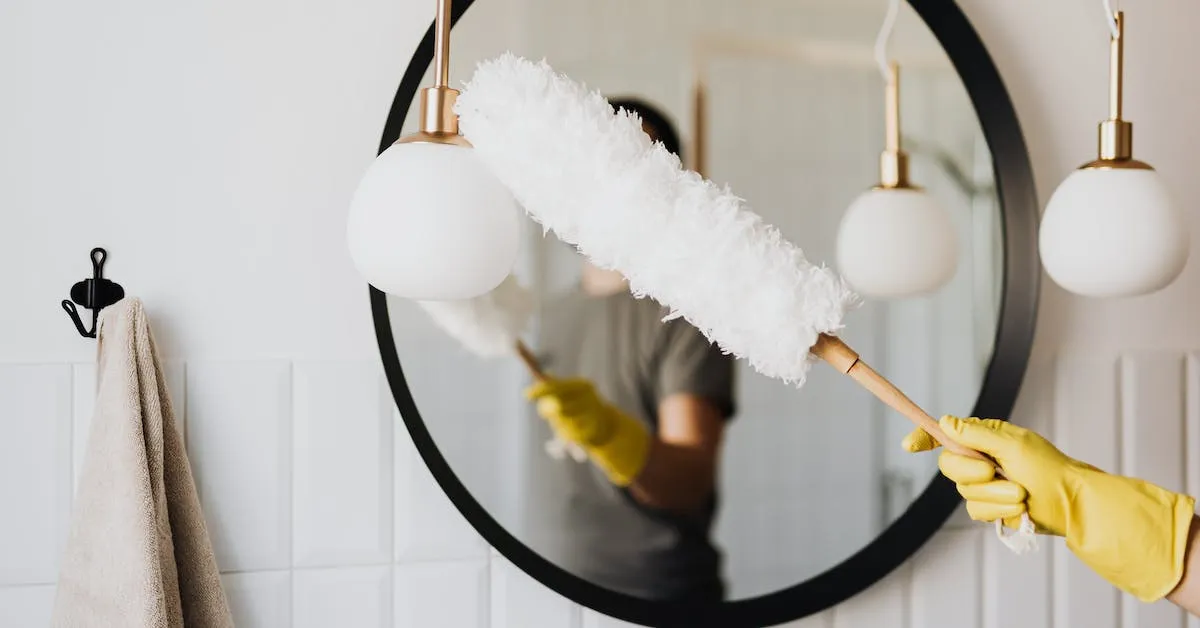Dust! It’s on your furniture, shelves, collectibles, and coffee table. It’s everywhere!! You clean your home and within a week, it’s back again. If you’re struggling with recurring dust and dealing with dust allergies, there may be underlying issues contributing to it. Let’s take a look at six important areas to check that could drastically improve your indoor air quality and reduce allergy symptoms.
Is Dust in the Home Normal?
Yes, a certain amount of dust is normal, especially in dry climates. It’s often made up of dead skin cells, clothing fibers, and pet dander. However, if dust seems to return just days after cleaning, there’s a good chance something else is causing the problem. Below are six key areas you should inspect.
1. Inspect the Dryer and Vent System
Your clothes dryer is essentially a pressurized lint machine. Over time, most dryers develop leaks that allow lint to escape through door seals, drum seals, or fractured vent ducts. If your dryer vent isn’t tightly sealed or has a crack, lint can easily be blown into your home, contributing to dust. For homes with dryers located in the garage, this risk is reduced, just be sure the vent is secure and free of damage.
2. Check Door and Window Seals
Poorly sealed doors and windows don’t just let in hot or cold air, they also allow dust from outside to enter. Missing or damaged weather stripping around doors, windows, and especially garage doors can be a major source of dust. If you can see light coming through the edges, it’s time to reseal.
3. Reconsider Old Carpet
Many people don’t realize their carpet may be contributing to the dust problem. As the bonding agents beneath older carpet deteriorate, they break down into fine dust-like particles. Walking on the carpet or vacuuming can release these into the air. And speaking of vacuums, most leak dust no matter how expensive they are. The best option is a water-filter vacuum, which traps dust much more effectively.
4. Seal the Attic Access Door
If your attic access isn’t properly sealed, it could be pulling dusty air from insulation, building materials, or even old pest treatments down into your living area. This can happen especially when your HVAC system is running, drawing air (and dust) through electrical outlets and light switches. A proper seal on your attic door is an easy and often overlooked fix.
5. Don’t Overlook the Basement
Just like attics, basements can significantly affect air quality. Dust, mold, and mildew are common in these areas, especially if they’re damp or unfinished. If you have a basement, make it a point to clean and inspect it regularly; this hidden area could be silently aggravating your allergies.
6. Maintain Your HVAC System
Dirty filters, vents, and ductwork are a leading cause of recirculating dust in your home. Neglected HVAC systems can accumulate dust that is then blown throughout your house. Consider hiring a specialist who focuses exclusively on HVAC cleaning to ensure your system is thoroughly cleaned and functioning properly.
Pro Tip: Use Smart Filtering
Skip the ultra-expensive filters that claim to block every allergen. These filters are often too restrictive and make your HVAC system work harder, reducing airflow and increasing your utility bill. A better solution is to use a high-quality washable filter paired with a standalone air purifier. You’ll save money and breathe easier.
Bonus Tip: Cut Out Coffee?
This might surprise you, but if you’re a regular coffee drinker, try cutting it from your diet and see if your allergy symptoms improve. I noticed a big change in my own health when I gave it up. Read about my experience with coffee and what I learned, you might be surprised by the connection: 8 Surprising Reasons to Limit Your Caffeine Intake
Conclusion
If you’re constantly battling dust and dealing with allergies, don’t just rely on frequent cleaning. Address the root causes by inspecting these six key areas around your home. A few small fixes can lead to a big difference in air quality and help ease your symptoms.
Want more helpful tips? Check out EPA resources on indoor air quality for more expert guidance.
FAQs About Dust Allergies and Home Air Quality
Yes, lint leakage from your dryer or dryer vent can significantly contribute to indoor dust. It’s a common and often overlooked source.
High-quality washable filters can be a great long-term investment. They’re cost-effective and reusable, but must be cleaned regularly to maintain performance.
Yes, a dedicated air purifier can remove dust, dander, and allergens from the air, especially in rooms where dust tends to collect.
It depends on usage and environment, but many experts recommend every 3–5 years, or sooner if you see signs of buildup or worsening allergies.
For some people, caffeine can impact the body’s histamine levels, potentially worsening allergy symptoms. Removing it from your diet could reveal a hidden trigger.
Absolutely, indoor air quality in your new home is very important. However, if your home is ‘new construction’ or less than two years old you can wait awhile to have the ducts cleaned.













